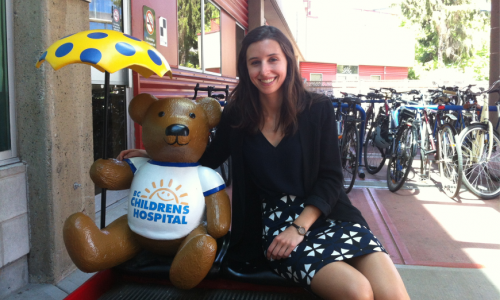
Co-op Staff Stories is a series of autobiographies of co-op staff at SFU. These stories showcase everything from what staff do here at the university to how they got to where they are now. Our goal is to help you see the varied ways that careers progress and evolve.
My first job after graduating from SFU was working as a receptionist for a security company. My “dream job” was to work as a recruiter in a Human Resources department but after six months of sending out resumes without a bite, I reluctantly accepted the receptionist role because I needed to pay my rent. I didn’t realize at the time it was the single best decision I would make in my career.
The first month was a tough one. The company was going through huge growth and had swelled to nearly 500 employees in under six months. I was a shy 23-year-old with no office experience working with a busy team with little time to train the new person. As the first point of contact for clients and colleagues, I couldn’t remain shy for long. My days were filled with people asking me questions about a company I knew little about. If I was to keep my job, I had to learn everything there was to know about the company and that meant talking to people. By the fourth month, I was starting to look like an efficient, organized and professional employee and I became the go-to person for Ali, the overworked human resources manager.
As the receptionist, I was also the first point of contact for interview candidates who’d sit nervously in the lobby waiting for their time to go in. I knew what it was like to be in that awkward seat and I’d try to engage them in small talk to help them relax and loosen up a bit. At the end of every interview, Ali would ask me what I thought of the candidate and I would give him my honest opinion about whether or not the person was a good fit. I had a good track record for picking the winners and pretty soon I wasn’t just giving my feedback on potential candidates, I was screening resumes, processing employee benefit claims, and participating in nearly every facet of the HR role. One day near the end of my first year, Ali quit. Before he left, he recommended to the company president that I take over as human resources manager. The president was planning on hiring someone with more experience but after Ali explained all that I had been doing in the department, he gave me a shot at the role. I was finally in my “dream job”, but I certainly didn’t get there the way I thought I would.
It’s only when I look back over my career do I see this story has all the elements I now encourage my own students to consider when they are thinking about their career progression:
1. Resume + Networking = Opportunity: Yes, a resume got me into this first job, but all jobs after that came through talking to people and networking. What you can do: Get out from behind your desk and talk to people. Say good morning. Eat in the staff lunchroom and ask people about their weekend, or tell them about a great new restaurant you went to. Don’t just talk to those in a similar position as you either – talk to your boss and your bosses’ boss. These innocent conversations not only make the job more fun, but when opportunities come up, you will be top of mind.
2. Do your best no matter what. Whether I was photocopying documents or hiring people, I gave 100% effort. The end result was instilling trust in people that I could be counted on, which led to more responsibilities and interesting work. What you can do: your first month on the job might have you photocopying or doing work that is less stimulating. Don’t distress! Focus on being the happiest and best photocopier they’ve ever had and I guarantee you will be asked to do other work that is more challenging.
3. Take risks. I accepted a job I felt I was overqualified for, but it wound up being a turning point in my career. What you can do: If you are waiting and waiting for that dream job you may be waiting for a very long time and miss opportunities in the process. Take the job with the position or employer that may not be “the one” and then work hard and talk to people because you never know where it might lead.
4. Say “yes” to the party. As I alluded to earlier, I am definitely more introverted than extroverted and often prefer a quiet night at home over going out. However, this company had nearly weekly office get-togethers. I knew if I was going to gel with these people, I had to learn to embrace the party. You know how they say that as many business deals are made on the golf course as in the office? That same principle applies to the office party. Saying yes to a chance to socialize with my co-workers meant creating stronger relationships and hearing about off the record office news (one particular office party is where Ali told me he was thinking of leaving). What you can do: You don’t have to go to every single party, but go to as many as you can. The upside is you can move beyond the small talk that generally occurs in the office and have more meaningful conversations with the people who sit next to you 8+ hours of your day.
5. Anticipate your boss’s needs. I made my boss’s life easier. From talking to Ali, I learned where the challenges were in the department and successfully helped him in those areas. What you can do: If you notice your supervisor is run off his or her feet, at a quiet moment (before work starts, over lunch, by the water cooler) ask if there is anything you can do to help. Better yet, do some careful observing and identify an area in which you can be helpful, then approach your supervisor with your observations and suggestions.
If you are struggling with what to do with your life or what next step to make, take a risk and say “yes” to a job that you had not envisioned for yourself. An unforeseen opportunity and lesson can follow risk taking which may lead you in an interesting and life changing new direction. At the very least, risk-taking and embracing the unexpected will build your confidence and may make for a good story to tell one day.





















